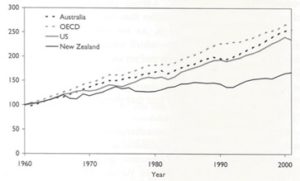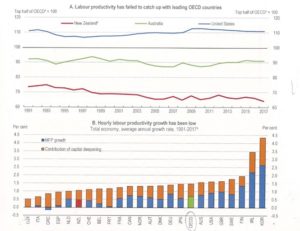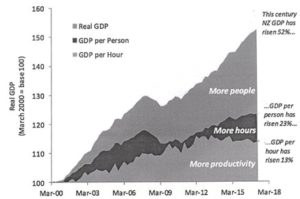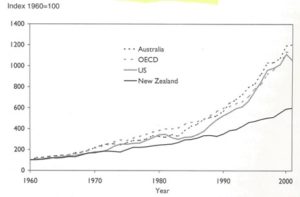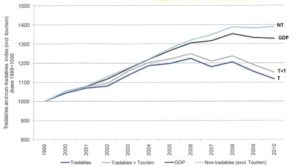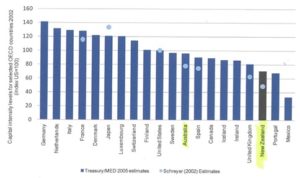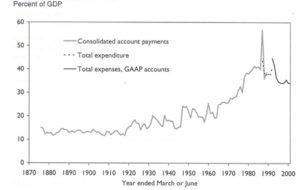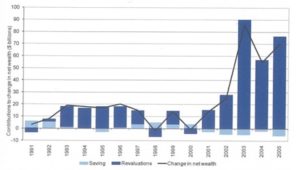Based on a speech to Kapiti Coast Probus, August 2020
Before Covid, the common mythology was that New Zealand had a strong, vibrant “Rock Star” economy, a high standard of living, strong capable political leaders, we were better than Australia and the envy of the World. However, the reality is quite different. New Zealand was in the top 3 OECD countries in 1960 but has been falling ever since. It now ranks in the thirties and has many serious/ intractable economic, social and environmental problems (1).
In 2003 a comprehensive study of the NZ economy concluded that “Compared to other OECD countries….NZ’s growth in Real GDP/Capita was slow”.
“NZ went from being one of the richest OECD countries…. to one of the poorest” (NZIER/Briggs, Looking at the Numbers).
So this paper is not a prediction of future problems but a documentation of what has already gone seriously wrong, over some decades and a why things will now only get worse. It is also a highly critical judgement on the incompetence and ineffectiveness of New Zealand’s political leadership over some decades. A web search will show many previous papers/speeches by me expressing increasing alarm about New Zealand’s deteriorating situation; the difference now is that I doubt the capacity of its political leaders to achieve any tangible improvement.
The fundamental cause of the problem is the lack of capable political leadership to implement the necessary policies, and politicians’ strong preference for the personal rewards of being in power ahead of improving National living standards.
The erosion of capability in the Public Service – the professional arm of government is also an important factor but this was also a political objective – the obligation to give “free and frank” advice was replaced by “no surprises” (Clark). And it has progressively lost its independence, capability, leadership and expertise. The SSC has been ineffective.
Critically governments increasingly avoid the difficult, complex “top of the cliff” policies – productivity, living standards, exports, population/immigration, work force etc and instead focus on “bottom of the cliff” wrecks. So improving household incomes is too tough but Working for Families (and Minimum/Living incomes) is a good political solution, papering over the cracks of policy failure. The difficulty is that the root cause problem is not dealt with, the consequences get worse and the cost of the band aids increase unproductive government spending. This is a downward spiral!
Immigration is a particular problem because population growth through large numbers of low economic value immigrants exacerbates many of the country’s most serious problems.
New Zealand’s values are also a serious challenge. Work by Webster and Perry (Massey University), in the context of the World Values Study concluded that:
- A major shift is needed in the culture of work to improve NZ’s economic prospects
- Equality is preferred, competition is rejected
- Excellence, hard work, productivity, etc are “dirty words”
- NZ’s values contrast with many better performing countries
The following graphs/data show the nature and extent of NZ’s problem:
1960-2000:
Real GDP/capita is the critical indicator of capacity to improve incomes and living standards sustainably. Between 1960 and 2000 NZ’ performance was much worse than the OECD average and Australia’s. This is the core of NZ”s problem and fudge/political spin (Well Being!) is not a solution.
*Real GDP per capita, New Zealand and OECD countries
Source: OECD/Briggs/NZIER
1991 – 2017:
NZ’s labour productivity growth has been low, below Australia’s and the average of the top half of the OECD, so NZ’s lacks the capacity to match their sustainable income increases.
*Labour Productivity is Weak
Source: OECD
2000-2018:
59% of NZ’s GDP growth was due to more people, 17% to people working longer hours and only 24% to higher productivity. This is a disaster – but demonstrates clearly why politicians focus on GDP, not GDP/capita and why they want higher immigration, regardless. More people means more spending on housing, infrastructure and consumption and more votes and party funds from grateful immigrants. But more people, done badly (low economic value) means lower living standards and exacerbates many of NZ’s serious problems. Immigration is just one of the BIG policy lies!
*Working harder not smarter
Source: Statistics NZ, JBWere Investment Strategy Group
A strong export performance and growth in tradable goods (goods traded internationally) typically correlates with higher GDP/capita and living standards but NZ’s export performance has been weak for some decades, lagging behind Australia and the OECD average.
*Export Volumes, OECD countries
Source: OECD/Briggs/NZIER
More recently non-tradables have accounted for an increasing share of GDP and tradables have been seriously lagging.
*Relative performance of the tradable and non-tradable sectors, including tourism 1999-2010
Source: Statistics NZ/SWG
A higher capital intensity – a higher capital: labour ratio increases labour productivity, but NZ’s capital intensity is relatively low, largely reflecting the failure of policy to encourage higher levels of capital investment, and utilisation.
*Capital intensity for selected OECD countries, 2002
Source: OECD; Economic Development Indicators 2005/SWG
Over recent decades there has been a dramatic increase in the Government expenditure to GDP ratio, primarily due to a big increase (good politics!) in welfare payments. In the 1950s the ratio averaged about 20%. However it subsequently increased sharply to about 40% in 1980 and has been at or above that level since – currently at 40%. This big structural change in the economy is likely to have had a serious negative impact of productivity and living standards, given the big increase in welfare spending and the fall in the “Other” category , which includes some useful economic spending/investments.
*Government Expenditure
Sources: Government expenditure figures are from Bloomfield (1984) and Budget statements. For GDP sources see Figure 12 (NZIER/Briggs). The chart shows March years to 1989, then June years. NZIER/Briggs
Finally, virtually all of the increase in Household Wealth since 1991 has not been due to savings and investment but to the revaluation of assets, a large part of which is due to rising house prices.
*Contributions to changes in net wealth
Source: Reserve Bank of NZ; Hodgetts, Briggs et al. (2006)/SWG
Conclusions
This is grim picture, one that has been sustained for decades for reasons outlined above, but politicians and governments have not acted effectively to improve the position, apart from Douglas and Bolger/Richardson. They continue to be highly paid and rewarded but their performance is clearly inadequate.
So what is to be done?
Well, the outlook is not good:
- The fundamental problems are too hard politically, in the absence of totally committed leadership – and the phobic denigration of Douglas is a strong disincentive. These problems include productivity, exports, population/immigration, excessive government spending, poverty/low living standards etc.
- But then there are the many other serious problems that get worse by the day, that are not fixed by band aids, leading to even more government spending which is not economically sustainable and at the expense of greater investment in a better performing economy.
This looks to me like a continuing deadly downward spiral which will put the Social Contract at risk and turn dealing with Climate Change into a total train wreck.
I wrote to PM Key a decade ago proposing an enquiry on economic policy (polite rejection) and to PM Ardern some 2 years ago suggesting that the situation warranted a Royal Commission on Policy but the letter was not even acknowledged. Maybe now?
FOOTNOTE:
(1) For example: productivity, low household incomes and living standards, exports, housing, poverty, mental health, diabetes, obesity, P/meth etc, excessive low value immigration/population growth, high welfare dependency, leaky buildings, earthquake standards, Christchurch rebuild, family violence, Auckland (economy, governance, etc), defence capability/alliances/Aus relations, sovereign risk, foreign investment, China, water policy, pollution/waste/recycling, threatened species, Fletchers, Fonterra, the electricity supply industry, the Public Sector, the political system and National politics, local government (especially the main Centers), excessive Govt spending/welfare/health costs/services, border protection, environmental management/conservation, no policy strategy or workforce strategy, family violence, asset sales, gun control, leadership generally, etc.


